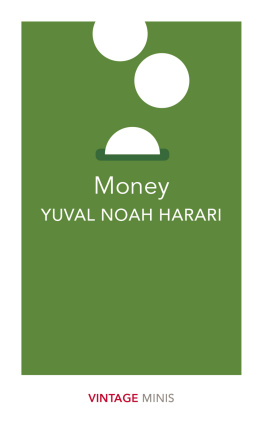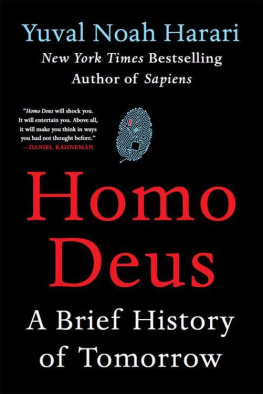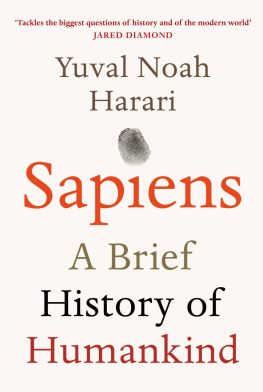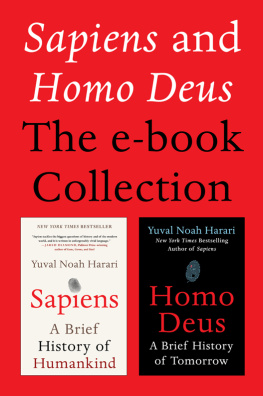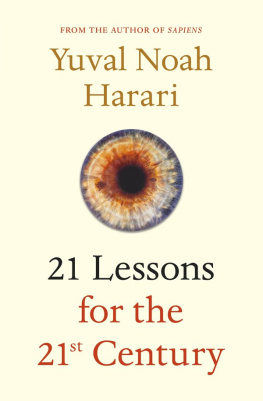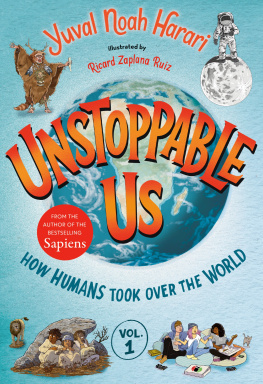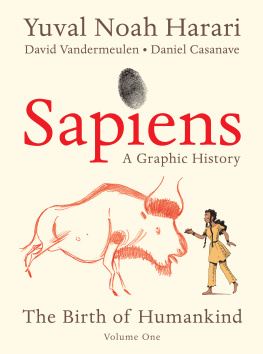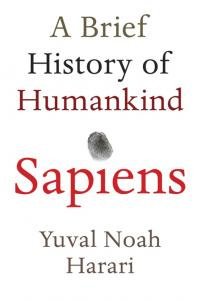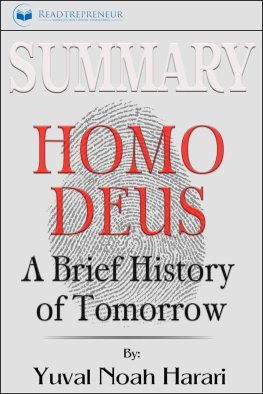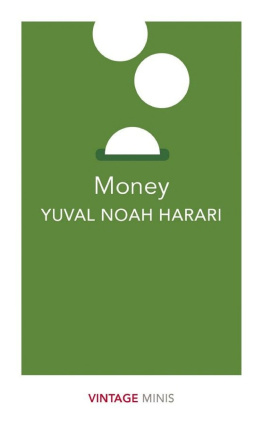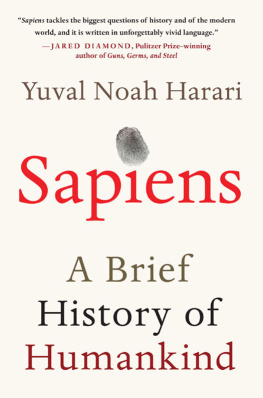This ebook is copyright material and must not be copied, reproduced, transferred, distributed, leased, licensed or publicly performed or used in any way except as specifically permitted in writing by the publishers, as allowed under the terms and conditions under which it was purchased or as strictly permitted by applicable copyright law. Any unauthorized distribution or use of this text may be a direct infringement of the authors and publishers rights and those responsible may be liable in law accordingly.
Epub ISBN: 9781473556041
Version 1.0
1 3 5 7 9 10 8 6 4 2
VINTAGE
20 Vauxhall Bridge Road,
London SW1V 2SA
Vintage is part of the Penguin Random House group of companies whose addresses can be found at global.penguinrandomhouse.com.
Extracts from Sapiens copyright Yuval Noah Harari 2011
Extracts from Homo Deus copyright Yuval Noah Harari 2015
Yuval Noah Harari has asserted his right to be identified as the author of this Work in accordance with the Copyright, Designs and Patents Act 1988
Sapiens was first published in Great Britain by Harvill Secker in 2014
Homo Deus was first published in Great Britain by Harvill Secker in 2016
This edition published by Vintage in 2018
penguin.co.uk/vintage
A CIP catalogue record for this book is available from the British Library
The Scent of Money
IN 1519 HERNN Corts and his Conquistadors invaded Mexico, hitherto an isolated human world. The Aztecs, as the people who lived there called themselves, quickly noticed that the aliens showed an extraordinary interest in a certain yellow metal. In fact, they never seemed to stop talking about it. The natives were not unfamiliar with gold it was pretty and easy to work, so they used it to make jewellery and statues, and they occasionally used gold dust as a medium of exchange. But when an Aztec wanted to buy something, he generally paid in cocoa beans or bolts of cloth. The Spanish obsession with gold thus seemed inexplicable. What was so important about a metal that could not be eaten, drunk or woven, and was too soft to use for tools or weapons? When the natives questioned Corts as to why the Spaniards had such a passion for gold, the conquistador answered, Because I and my companions suffer from a disease of the heart which can be cured only with gold.
In the Afro-Asian world from which the Spaniards came, the obsession for gold was indeed an epidemic. Even the bitterest of enemies lusted after the same useless yellow metal. Three centuries before the conquest of Mexico, the ancestors of Corts and his army waged a bloody war of religion against the Muslim kingdoms in Iberia and North Africa. The followers of Christ and the followers of Allah killed each other by the thousands, devastated fields and orchards, and turned prosperous cities into smouldering ruins all for the greater glory of Christ or Allah.
As the Christians gradually gained the upper hand, they marked their victories not only by destroying mosques and building churches, but also by issuing new gold and silver coins bearing the sign of the cross and thanking God for His help in combating the infidels. Yet alongside the new currency, the victors minted another type of coin, called the millares, which carried a somewhat different message. These square coins made by the Christian conquerors were emblazoned with flowing Arabic script that declared: There is no god except Allah, and Muhammad is Allahs messenger. Even the Catholic bishops of Melgueil and Agde issued these faithful copies of popular Muslim coins, and God-fearing Christians happily used them.
Tolerance flourished on the other side of the hill too. Muslim merchants in North Africa conducted business using Christian coins such as the Florentine florin, the Venetian ducat and the Neapolitan gigliato. Even Muslim rulers who called for jihad against the infidel Christians were glad to receive taxes in coins that invoked Christ and His Virgin Mother.
How Much Is It?
HUNTER-GATHERERS HAD no money. Each band hunted, gathered and manufactured almost everything it required, from meat to medicine, from sandals to sorcery. Different band members may have specialised in different tasks, but they shared their goods and services through an economy of favours and obligations. A piece of meat given for free would carry with it the assumption of reciprocity say, free medical assistance. The band was economically independent; only a few rare items that could not be found locally seashells, pigments, obsidian and the like had to be obtained from strangers. This could usually be done by simple barter: Well give you pretty seashells, and youll give us high-quality flint.
Little of this changed with the onset of the Agricultural Revolution. Most people continued to live in small, intimate communities. Much like a hunter-gatherer band, each village was a self-sufficient economic unit, maintained by mutual favours and obligations plus a little barter with outsiders. One villager may have been particularly adept at making shoes, another at dispensing medical care, so villagers knew where to turn when barefoot or sick. But villages were small and their economies limited, so there could be no full-time shoemakers and doctors.
The rise of cities and kingdoms and the improvement in transport infrastructure brought about new opportunities for specialisation. Densely populated cities provided full-time employment not just for professional shoemakers and doctors, but also for carpenters, priests, soldiers and lawyers. Villages that gained a reputation for producing really good wine, olive oil or ceramics discovered that it was worth their while to specialise nearly exclusively in that product and trade it with other settlements for all the other goods they needed. This made a lot of sense. Climates and soils differ, so why drink mediocre wine from your backyard if you can buy a smoother variety from a place whose soil and climate is much better suited to grape vines? If the clay in your backyard makes stronger and prettier pots, then you can make an exchange. Furthermore, full-time specialist vintners and potters, not to mention doctors and lawyers, can hone their expertise to the benefit of all. But specialisation created a problem how do you manage the exchange of goods between the specialists?
An economy of favours and obligations doesnt work when large numbers of strangers try to cooperate. Its one thing to provide free assistance to a sister or a neighbour, a very different thing to take care of foreigners who might never reciprocate the favour. One can fall back on barter. But barter is effective only when exchanging a limited range of products. It cannot form the basis for a complex economy.
In order to understand the limitations of barter, imagine that you own an apple orchard in the hill country that produces the crispest, sweetest apples in the entire province. You work so hard in your orchard that your shoes wear out. So you harness up your donkey cart and head to the market town down by the river. Your neighbour told you that a shoemaker on the south end of the marketplace made him a really sturdy pair of boots thats lasted him through five seasons. You find the shoemakers shop and offer to barter some of your apples in exchange for the shoes you need.

